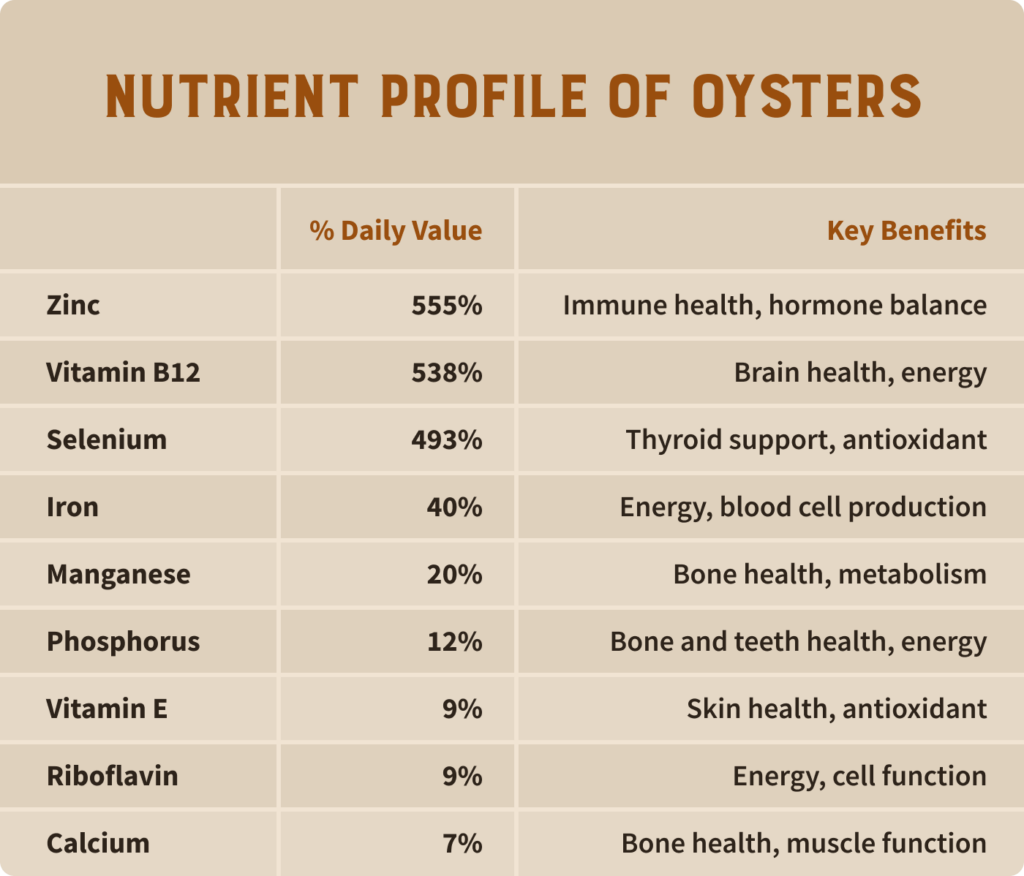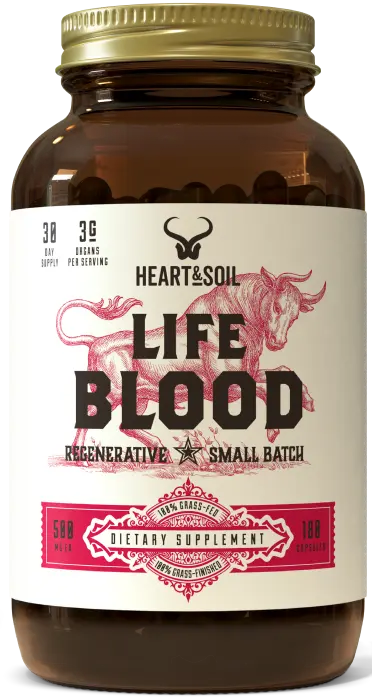PLEASE NOTE: The information in this blog is for educational purposes only. It is not a substitute for professional medical advice. Consult your healthcare provider if you’re seeking medical advice, diagnoses, or treatment.
Oysters have been consumed as a delicacy for centuries and adored by chefs worldwide, but are oysters good for you or just delicious? In this post, we’ll delve into the world of oysters, exploring their history, nutrient profile, and potential health benefits.
What We’ll Cover
- The history of oyster consumption
- Their nutrient profile
- Potential health benefits
- Heavy metal concentrations
- Farmed vs. wild
- Raw vs. cooked
- How often you should eat them
- Ways to eat oysters
What Makes Oysters Unique?
Oysters are mollusks with two-hinged shells that protect their soft bodies. While they have a heart and internal organs, they lack a central nervous system.
Oysters are found in coastal waters worldwide, from Canada to Argentina and Japan to Washington. They feed by filtering the organic matter from the water around them.
An Ancient Delicacy
For thousands of years, oysters have been a culinary and cultural staple. They’ve even been used as tools, utensils, and jewelry. Oyster farming (aquaculture) has been practiced for over 2,000 years, and Archaeological evidence of oyster shells found in trash pits along the Chesapeake Bay dates back more than 1,000 years ago (1).
In Eastern medicine, oysters have long been valued for their benefits in supporting liver health, immunity, and sexual function (2, 3).
The Nutrition Profile of Oysters
Oysters are tiny nutritional powerhouses, with their flesh made up of approximately half protein, one-third glycogen (a quick energy source), and 10% fat (4).
Here’s a breakdown of what you get from a 3.5-ounce serving of cooked wild eastern oysters (5):

With such a robust nutrient profile, it’s no surprise that oysters are celebrated for their wide-ranging health benefits.
Top Health Benefits of Oysters
Immune Health
Oysters are rich in zinc, a critical nutrient for immune function, wound healing, and combatting infections. They also contain antimicrobial peptides that fight a wide range of harmful bacteria, fungi, and other pathogens (6). Recent research shows that oyster proteins have strong anti-inflammatory properties, further supporting immune resilience.
Hormonal Health
Zinc also plays a key role in hormone production, supporting testosterone levels and balanced hormones in both males and females, which is crucial for fertility and libido (7).
Brain Function
The B12 and omega-3 fatty acids in oysters support cognitive function, mood regulation, and overall brain health (8, 9, 10, 11). Just a few ounces of oysters exceed the recommended daily intake for DHA and EPA, two vital omega-3 fatty acids (12)!
Energy and Endurance
Studies show that oyster proteins enhance physical performance by boosting energy stores in muscles and the liver (13). They also regulate lactic acid and blood urea levels, reducing fatigue and promoting endurance during exercise (14, 15).
Heart Health
The omega-3s and selenium in oysters help reduce inflammation and oxidative stress, promoting cardiovascular health. Specific oyster peptides have been found to lower blood pressure and act as anticoagulants, reducing the risk of clotting (16, 17, 18).
Skin and Hair Health
Zinc, antioxidants, and collagen precursors in oysters support skin repair, elasticity, and hydration. Research shows that oyster peptides reduce wrinkles and promote glowing skin by mitigating skin damage caused by oxidative stress and inflammation (19, 20, 21).
Thyroid Function
Oysters are an excellent source of selenium and iodine, which are essential for thyroid hormone production and a healthy metabolism (22, 23).
Detoxification
Selenium in oysters helps the body detoxify by neutralizing heavy metal ions like mercury and protecting against toxins produced by mold and fungi (24).
Cellular Defense
Oysters contain powerful antioxidant peptides that shield cells from oxidative damage (25, 26). One type of oyster peptide induces the death of prostate, breast, and lung cancer cells without harming healthy cells (27), and another type has shown anticancer effects on colon carcinoma cell lines (28).

Heavy Metals and Oysters
Are oysters good for you despite concerns about heavy metals?
Seafood absorbs heavy metals from pollution and other sources, but oysters, being lower on the food chain, tend to accumulate far fewer than larger fish. Studies show that cadmium, mercury, and lead levels in oysters are typically far below safety standards, making them a safe choice for regular consumption (29).
How Often Should You Eat Oysters?
Oysters can be a fantastic addition to an animal-based diet when enjoyed a couple of times a week. However, limit excessive consumption to avoid overloading on zinc or trace amounts of heavy metals.
Farmed vs Wild Oysters: Which Should You Choose?
Both farmed and wild oysters are excellent nutrient-rich options, but their growth conditions and environmental impacts differ.
Farmed Oysters
- Conditions: They’re uniformly grown in controlled settings with monitored water quality.
- Contaminants: Because farmed oysters are often grown in areas with regulated pollution levels, they may have lower exposure to heavy metals or contaminants compared to their wild counterparts. However, farming locations near urban or industrial runoff can still lead to contamination.
- Sustainability: They’re regarded as sustainable since they don’t require external feed and help improve water quality.
Wild Oysters
- Conditions: They grow naturally in coastal waters, attaching themselves to rocks, reefs, or other surfaces. Depending on the environmental conditions, they vary in size, shape, and flavor.
- Contaminants: May face slightly higher exposure to pollutants in uncontrolled habitats.
- Sustainability: Contribute to reef ecosystems but can be overfished in some regions.
Raw vs Cooked Oysters
Here’s the most controversial question we’ve all been waiting for. Are raw oysters safe to eat?
Raw Oysters
Raw oysters retain more heat-sensitive nutrients (like vitamin C and B vitamins) and enzymes but carry a higher risk of foodborne illness from Vibrio bacteria, which naturally inhabit coastal waters and can cause diarrhea and vomiting. If you decide to consume raw oysters, ensure you source your raw oysters from reputable suppliers to reduce the risk.
Cooked Oysters
Cooking oysters through boiling, grilling, baking, smoking, and steaming effectively kills Vibro bacteria but still provides a wealth of protein, minerals (like iron and zinc), and other nutrients. However, compared to raw oysters, they may have a slightly lower content of vitamin C, B vitamins, taurine, omega-3s, and some enzymes (30).
Can You Eat The Shell?
Oyster shells are mainly composed of calcium carbonate, and though not widely popular, you may have heard of oyster shell supplementation. Some studies on rats have shown that fortifying food with oyster shells can help boost calcium levels in the body and support bone health, such as in individuals with osteoporosis (31).

4 Ways to Eat Oysters
Now that you understand the numerous health benefits of oysters, here are some delicious and simple ways to consume oysters as part of your animal-based diet:
- Raw with Lemon: Enjoy them raw from a reputable source with a squeeze of fresh lemon juice.
- Baked in Butter: Bake them in butter with a sprinkle of herbs.
- Grilled Oysters: Add parmesan for a flavorful twist.
- Oyster Stew: Combine oysters with diced potatoes, cream, and seasonings; a wonderful meal for a wintry day!
Are Oysters Good for You? The Bottom Line
Oysters remain one of the most nutrient-packed treasures from the sea. Rich in zinc, vitamin B12, iron, copper, and other nutrients, they aid nearly every function of the body.
Incorporating oysters into your balanced animal-based diet is a great way to support immune health, hormonal balance, thyroid function, and cognition. Give them a try raw, cooked, or in a stew, and we hope you like them as much as we do!
Support Your Iron Stores
With Lifeblood from Heart & Soil
Subscribe to future articles like this:
